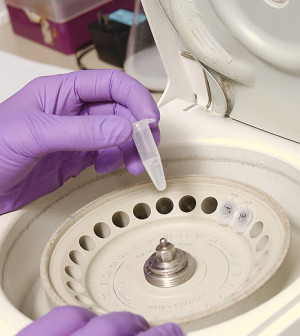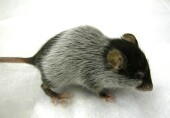- Could Artificial Sweeteners Be Aging the Brain Faster?
- Techniques for Soothing Your Nervous System
- Does the Water in Your House Smell Funny? Here’s Why
- Can a Daily Dose of Apple Cider Vinegar Actually Aid Weight Loss?
- 6 Health Beverages That Can Actually Spike Your Blood Sugar
- Treatment Options for Social Anxiety Disorder
- Understanding the Connection Between Anxiety and Depression
- How Daily Prunes Can Influence Cholesterol and Inflammation
- When to Take B12 for Better Absorption and Energy
- Epsom Salts: Health Benefits and Uses
Potential Ebola Drug Target Identified in Mouse Study


Researchers working with rodents say they’ve pinpointed a potential target for drugs to fight Ebola.
Studies with mice revealed that a protein called Niemann-Pick C1 (NPC1) plays a critical role in Ebola’s ability to infect a host.
Drugs that block this protein might prove effective against the deadly disease, according to the authors of the study in the May/June issue of the online journal mBio.
“The science behind the concept of blocking the interaction between NPC1 and the virus is solid. Now, it is just a matter of powering through and identifying drugs that can inhibit NPC1 and moving them forward,” co-principal investigator John Dye Jr., chief of viral immunology at U.S. Army Medical Research Institute of Infectious Diseases, said in a journal news release.
Previous lab studies showed that Ebola enters host cells by binding directly to NPC1, and that blocking the virus from doing this prevents infection, the researchers say.
In this study, the researchers found that mice genetically altered to lack NPC1 were not infected nine days after exposure to Ebola.
The team then tested three NPC1 inhibitors in normal mice exposed to Ebola. Only two of the drugs provided minimal protection. While studies on animals often fails to produce similar results in humans, further research could lead to more effective drugs, the investigators said.
There is no U.S. Food and Drug Administration-approved treatment for Ebola, the virus that has killed more than 11,000 people in West Africa since last year. Treatments under development focus on attacking the virus. A drug that targets NPC1 would be the first host-based treatment approach, the study authors said.
More information
The U.S. Centers for Disease Control and Prevention has more about Ebola.
Source: HealthDay
Copyright © 2026 HealthDay. All rights reserved.










